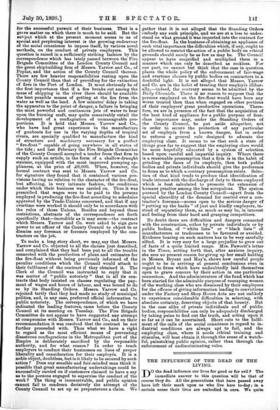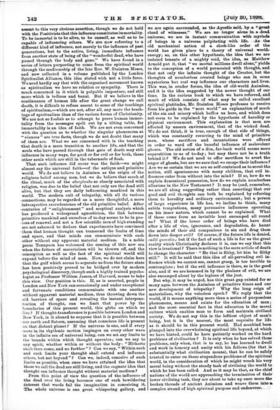THE INFLUENCE OF THE DEAD ON THE LIVING.
DO the dead influence our lives for good or for evil? The immediate answer to this question will be that of course they do. All the generations that have passed away have left their mark upon us who live here to-day; in a certain sense their lives are embodied in ours. We quite assent to this very obvious assertion, though we do not hold with the Positivists that this influence constitutes immortality. To be immortal is to be alive, to be oneself, as well as to be capable of influencing others. We are now referring to a different kind of influence, not merely to the influence of past generations, but to the active, living, immediate influence from another state of being of the "wonderful dead, who have passed through the body and gone." We have found in a series of letters purporting to come from the spiritual world through the mediumship of the late Rev. W. Stainton Moses, and now collected in a volume published by the London Spiritualist Alliance, this idea stated with not a little force. We need hardly say that with the organised movement known ae spiritualism we have no relation or sympathy. There is much concerned in it which is palpable imposture, and still more which is tedious and banal. But if we believe in the continuance of human life after the great change we call -death, it is difficult to refuse assent to some of the teachings of spiritualism,—which are not, after all, any more the teach- ings of spiritualism than of the various forms of Christianity. We are not so foolish as to attempt to prove human immor- tality from the messages spelt out by a tilting table, for immortality is an idea of faith. We are not even concerned with the question as to whether the singular phenomena at " seances " are true facts, though we do not doubt that many of them are. What we are concerned with is the teaching that death is a mere transition to another life, and that the souls who have passed through that gate of death may still influence in many ways, for good or for evil or for both, those other souls which are still in the tabernacle of flesh.
That such influence did occur was the faith—we might almost say the universal faith—of the antique and primitive world. We do not believe in Animism as the origin of the religious belief among men, but we do believe that much of the ritual, much of the aberglaube so closely associated with religion, was due to the belief that not only are the dead still alive, but that they are daily influencing mankind in this world. The modern cult of telepathy, with all its various • connections, may be regarded as a more thoughtful, a more introspective recrudescence of the old primitive belief. After -centuries of " enlightenment" and sceptical analysis which has produced a widespread agnosticism, the link between primitive mankind and ourselves of to-day seems to be in pro- - cess of renewal, and not a few scientific men of high standing are not ashamed to declare that experiments have convinced -them that human thought can transcend the limits of time and space, and that minds can communicate with each other without any apparent material medium. In a noble poem Tennyson has welcomed the coming of this new era when the fetters of materialism will be thrown off, and the conception as well as the fact of the spiritual world will expand before the mind of man. Now, we do not claim here that the gulf which seems to separate us from the future state has been positively proved to be bridged over by modern psychological discovery, though such a highly trained psycho- logist as Professor William James, of Harvard, seems to take this view. Our position is this. If, as is asserted, people in London and New York can occasionally and under exceptional and fortunate conditions communicate with one another without apparent material medium, thus throwing down the old barriers of space and revealing the instant interpene- tration of thought, can we limit that power by the boundaries of this present world, this globe on which we live? If thought-transference is possible between London and New York, is it absurd to suppose that it is possible between oar earth and Saturn, assuming that conscious life is present on that distant planet ? If the universe is one, and if every
• wave in its rhythmic motion impinges on every other wave in the infinite sea of universal being, can we set any limits to the bounds within which thought operates ; can we say to any spirit, whether within or without the body : "Hitherto shalt thou come, and no further " ? Can we say, " Within such and such limits your thought shall extend and influence ethers, but not beyond " ? Can we, indeed, conceive of such limits as possible, when once we have attained the idea that those we call the dead are still living, and the cognate idea that thought can influence thought without material medium ?
From this point of view the question of the influence of the dead over the living becomes one of such bewildering interest that words fail the imagination in conceiving it. 'The whole universe is one great whispering gallery, and
we are again surrounded, as the Apostle said, by a "great cloud of witnesses." We are no longer alone in a dead universe, we are in instant communication with myriads of beings in a universe palpitating with life. As the old mechanical notion of a clock-like order of the world has given place to a theory of universal world- energy; so, on this other hypothesis, the idea that we are isolated tenants of a mighty void, the idea, as Matthew Arnold put it, that " we mortal millions dwell alone," yields to the conception of a world permeated with thought, and that not only the infinite thought of the Creator, but the thoughts of numberless created beings who can in some mysterious but real way influence our characters and lives. This was, in cruder forms, the idea of old-world Animism, and it is the idea suggested by the newer thought of our time. In the curious book to which we have referred, and much of which consists of what may be called excellent spiritual platitudes, Mr. Stainton Moses professes to receive from his guide in the " next world " an explanation of much of the sin and misery which baffles us here, and which does not seem to be explained by the hypothesis of heredity or physical environment. This explanation is that men are affected by unseen environment, that of the wicked dead. We do not think, it is true, enough of that side of things, which was constantly recurring to the mind of primitive man, whose sacrifices and incantations were offered in order to ward off the baneful influence of malevolent ghosts. The old notion of a dim, far-back world seems mere superstition to us of to-day ; but may there not be a truth behind it ? We do not need to offer sacrifices to avert the anger of ghosts, but are we sure that we escape their influence P Are we so certain that we are so self-contained as to scout the notion, still spontaneous with many children, that evil in- fluences enter from without into the mind ? If so, how do we explain demoniacal possession, bow do we explain numberless allusions in the New Testament P It may be (and, remember, we are all along suggesting rather than asserting) that our good and evil thoughts can both be explained by referring them to heredity and ordinary environment ; but a person of large experience in life has, we incline to think, many subtle temptations, many persuasive influences operating on his inner nature, which cannot be so explained. What if these come from an invisible host encamped all round us ? What if the lower order of beings who have died after a life of vice, ignorance, and degradation, do haunt the minds of their old companions in sin and drag them down into deeper evil? Of course, if the future life is denied, eadit quaestio ; but if the fact of such a life is for us the great reality which Christianity declares it is, can we say that this view is irrational ? There is nothing in the mere article of death to change the character • " He that is filthy, let him be filthy still." It will be said that this idea of all-pervading evil in- fluence which we cannot see, cannot grasp, is too terrible to contemplate ; but if the evil influence is there, so is the good also, and if we are hemmed in by the phalanx of evil, we are also encamped about by the legions of the just.
But why, it may be urged, has this great gap existed for so many ages, between the Animism of primitive times and our new development of telepathy ? Why the long reign of materialism, why the voiceless epoch ? We reply that the world, if it means anything more than a series of purposeless phenomena, means and exists for the education of man ; and the most essential fact in that education is the moral culture which enables man to form and maintain civilised society. We do not say this is the loftiest object of man's being, but it is the nearest, the most requisite for life as it should be in this present world. Had mankind been plunged into the overwhelming spiritual life beyond, at which we have hinted, could he have patiently worked on the hard problems of civilisation ? It is only when he has solved these problems, only when, that is to say, he has learned to dwell and work in honesty and amity with his fellows (for that is substantially what civilisation means), that he can be safely trusted to enter on these stupendous problems of the spiritual world, in the consideration of which he might wreck his very moral being without the steady task of civilising the world to which he has been called. And so it may be that, as the chief nations of the world are approaching the termination of their lower civilising task, they are about to take up once more the broken threads of ancient Animism and weave them into a. complex strand of high spiritual purpose and endeavour.



































 Previous page
Previous page